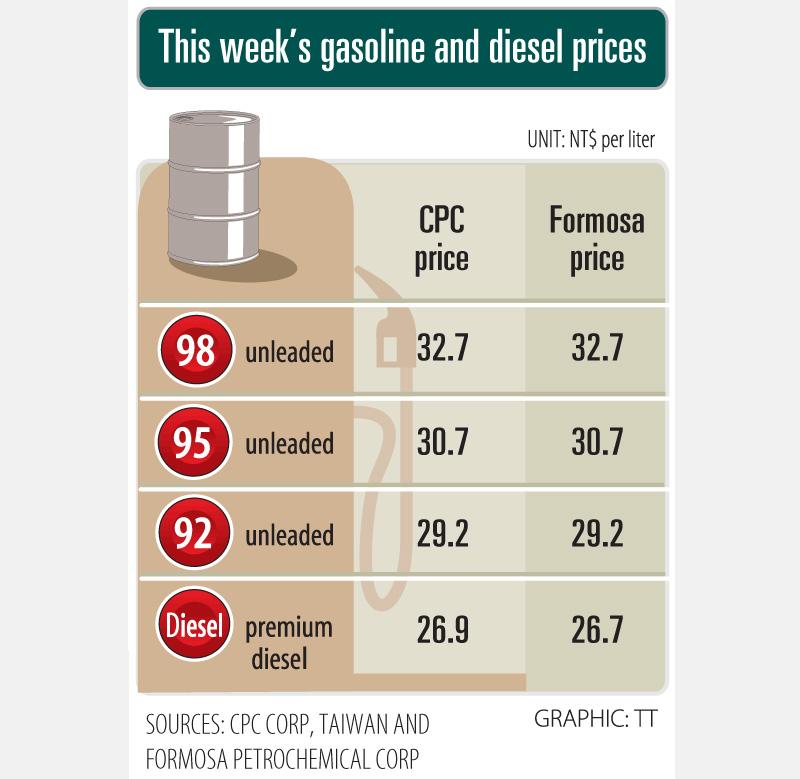CPC Corp, Taiwan (CPC, 台灣中油) and Formosa Petrochemical Corp (台塑石化) yesterday said they would raise gasoline prices by NT$0.2 per liter, effective today, after cutting prices by NT$0.1 per liter last week.
The price of diesel would also increase by NT$0.1 per liter this week, after remaining unchanged the previous week, the companies said.
Prices at CPC stations would increase to NT$29.2, NT$30.7 and NT$32.7 per liter for 92, 95 and 98-octane unleaded gasoline respectively, while the price of premium diesel would rise to NT$26.9 per liter, the state-owned refiner said.

Prices at Formosa stations would advance to NT$29.2, NT$30.7 and NT$32.7 per liter for 92, 95 and 98-octane unleaded gasoline respectively, while the price of premium diesel would rise to NT$26.7 per liter, the company said.
CPC said in a statement that based on its floating oil price formula, the cost of crude oil last week increased 1.2 percent from a week earlier.
The company attributed the increase to positive market sentiment driven by factors such as the G7’s plan to set a ceiling on Russian oil prices and OPEC’s optimistic view on global oil demand.
CPC said gasoline and diesel prices should have risen by NT$3.7 and NT$4.9 per liter this week, but it implemented a price stabilization mechanism to absorb part of the increase in compliance with government policy.
In the first eight months of this year, CPC spent NT$31.79 billion (US$1.02 billion) to absorb higher fuel costs, it said.
Other factors that also weighed on the oil market last week include stalled negotiations on the Iran nuclear deal, the US’ plan to replenish its strategic oil reserves and anticipated rate hikes by the US Federal Reserve that boosted the US dollar, Formosa said in a separate statement.

Application-specific integrated circuit designer Faraday Technology Corp (智原) yesterday said that although revenue this quarter would decline 30 percent from last quarter, it retained its full-year forecast of revenue growth of 100 percent. The company attributed the quarterly drop to a slowdown in customers’ production of chips using Faraday’s advanced packaging technology. The company is still confident about its revenue growth this year, given its strong “design-win” — or the projects it won to help customers design their chips, Faraday president Steve Wang (王國雍) told an online earnings conference. “The design-win this year is better than we expected. We believe we will win

Intel Corp chief executive officer Lip-Bu Tan (陳立武) is expected to meet with Taiwanese suppliers next month in conjunction with the opening of the Computex Taipei trade show, supply chain sources said on Monday. The visit, the first for Tan to Taiwan since assuming his new post last month, would be aimed at enhancing Intel’s ties with suppliers in Taiwan as he attempts to help turn around the struggling US chipmaker, the sources said. Tan is to hold a banquet to celebrate Intel’s 40-year presence in Taiwan before Computex opens on May 20 and invite dozens of Taiwanese suppliers to exchange views

Chizuko Kimura has become the first female sushi chef in the world to win a Michelin star, fulfilling a promise she made to her dying husband to continue his legacy. The 54-year-old Japanese chef regained the Michelin star her late husband, Shunei Kimura, won three years ago for their Sushi Shunei restaurant in Paris. For Shunei Kimura, the star was a dream come true. However, the joy was short-lived. He died from cancer just three months later in June 2022. He was 65. The following year, the restaurant in the heart of Montmartre lost its star rating. Chizuko Kimura insisted that the new star is still down

While China’s leaders use their economic and political might to fight US President Donald Trump’s trade war “to the end,” its army of social media soldiers are embarking on a more humorous campaign online. Trump’s tariff blitz has seen Washington and Beijing impose eye-watering duties on imports from the other, fanning a standoff between the economic superpowers that has sparked global recession fears and sent markets into a tailspin. Trump says his policy is a response to years of being “ripped off” by other countries and aims to bring manufacturing to the US, forcing companies to employ US workers. However, China’s online warriors